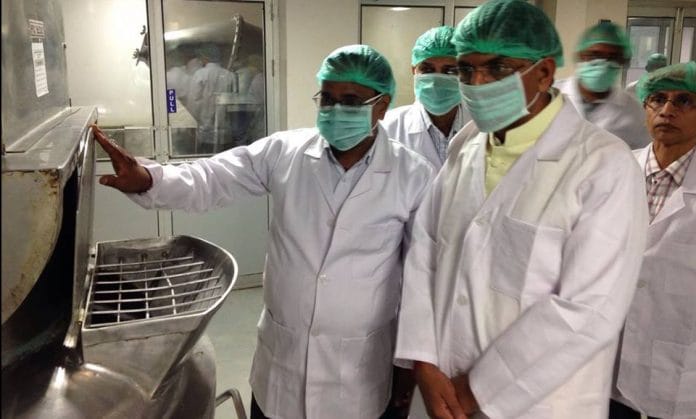Centre’s flagship scheme for affordable medicines has been under a cloud, with allegations of fraud, and top officials’ resignations.
New Delhi: The Centre’s flagship affordable medicines scheme was already under the spotlight for allegations of fraud and for being a rudderless ship. But now, the Pradhan Mantra Bharatiya Janaushadhi Pariyojana (PMBJP) has suffered another blow, with six batches of medicines being recalled in three months for failing quality tests.
What’s more, the department responsible for the implementation of the scheme, the Bureau of Pharma PSUs of India (BPPI), currently doesn’t have anyone heading its quality control, regulatory affairs, or medicine procurement departments, leading to questions over who exactly is in charge of ensuring the safety and efficacy of the medicines.
The ministry of chemicals and fertilisers, which controls pharmaceuticals, has already launched an internal probe into 14 allegations against the BPPI, including financial misappropriation and flouting its own rules for procurement, made by the government’s own auditor, the Office of the Chief Controller of Accounts.
Worse still, the BPPI is itself headless, with three CEOs resigning in three years ; the last of whom, Biplab Chatterjee, has been running the show on an interim basis since his resignation in November.
Recall of medicines
The BPPI has had to recall four batches of medicines in the last month from Karnataka alone, after failing standard quality tests conducted by the state’s drug controllers. It confirmed that six recalls have taken place in the last three months in the states of Karnataka and Tripura, compared to 11 recalls in 12 months last year.
According to recall notifications reviewed by ThePrint, the drugs recalled since January are DC 420 (a combination of atorvastatin and clopidogrel), sucralfate, paracetamol syrup, Vitamin C tablets, amoxiclav syrup and baclofen tablets.
The recall of sucralfate oral suspension, for example, was initiated on 9 March after a retailer circulated a picture on a WhatsApp group of 270 of Karnataka’s jan aushadhi store owners, showing an insect floating inside a glass bottle. Sucralfate is a medicine used to treat intestinal ulcers.
Apart from quality concerns, store owners throughout the country complain of irregular stocks. “Ideally, we must stock about 700 formulations, but we hardly get the supply of 100 to 150 formulations,” a store owner who wished to remain anonymous told ThePrint.
BPPI’s defence
The BPPI, on its part, has attributed the lapses to the environmental conditions such as the change in temperature and the way the products were stored, among other things.
“Our products are sent to retailers after they pass the quality tests from the National Accreditation Board for Testing and Calibration Laboratories (NABL). Any alteration in the potency of medicine is beyond control. We recall the medicines immediately after state drug controllers inform us and block the billing on the medicine,” said BPPI’s interim CEO Biplab Chatterjee.
Since the Modi government decided to revive the UPA’s Jan Aushadhi Scheme, the number of stores has expanded from 85 to 3,200, with the target being to expand to 5,000 outlets by the end of 2019. But quality control leaves much to be desired.
As mentioned above, the head of the department positions in quality control, regulatory affairs and medicine procurements all lie vacant. The procurement department is even worse off, since it doesn’t even have a manager (the second senior-most position in the department) since October 2017. After Reena Bhagat quit the quality control manager’s job in October, Mahadev Agarwal, manager of procurements, was given responsibility of the quality control, leaving procurement in the hands of interim officers.
The BPPI is issuing advertisements to fill its crucial vacancies, and Chatterjee said this process, as well as the search for his successor as CEO, would be completed soon. “There are several vacancies in the organisation, and we are finding people. However, there will be some shortfalls, and we are working on it,” he said.







This is an eye opener article. Quality control on efficacy of medicines should be given primary importance since it directly affects people’s health issues. My friend has sent me medicines for 30 days bought from a PMJAY Shop at one fourth of its regular medical shop costs which is unbelievable. I am now troubled and worried whether to begin to take this medicines compromising my health issues.
“Medicines in PMJAY Stores are not cheap medicines they are medicines labelled with genuine /fair MRP” “Medicines in PMJAY Stores are not only for poor people they are for people from all economic strata who are being fleeced by some by labeling ‘same’ medicine under a different BRAND name with highly inflated MRP” “There is no subsidy from GOI on these medicines still they cost so less because they are not marked with unfairly inflated MRP” ,” come forward to promote use of Medicines by Chemical / Generic name and honor socially the Doctors who write medicines by chemical name / generic name”. )
*****Honestly provide feed back to Hon’ble PM.***
“Report those doctors who write by brand name even where there are Government orders for writing prescription by chemical name. dayasagr45@yahoo.com
Each community Pharmacy holding valid license the Government can fulfill their interest of providing public quality medicines with affordable prices through this channel itself
Another failure of governments unnecessary special programs
Please try to upgrade community pharmacies by some programs